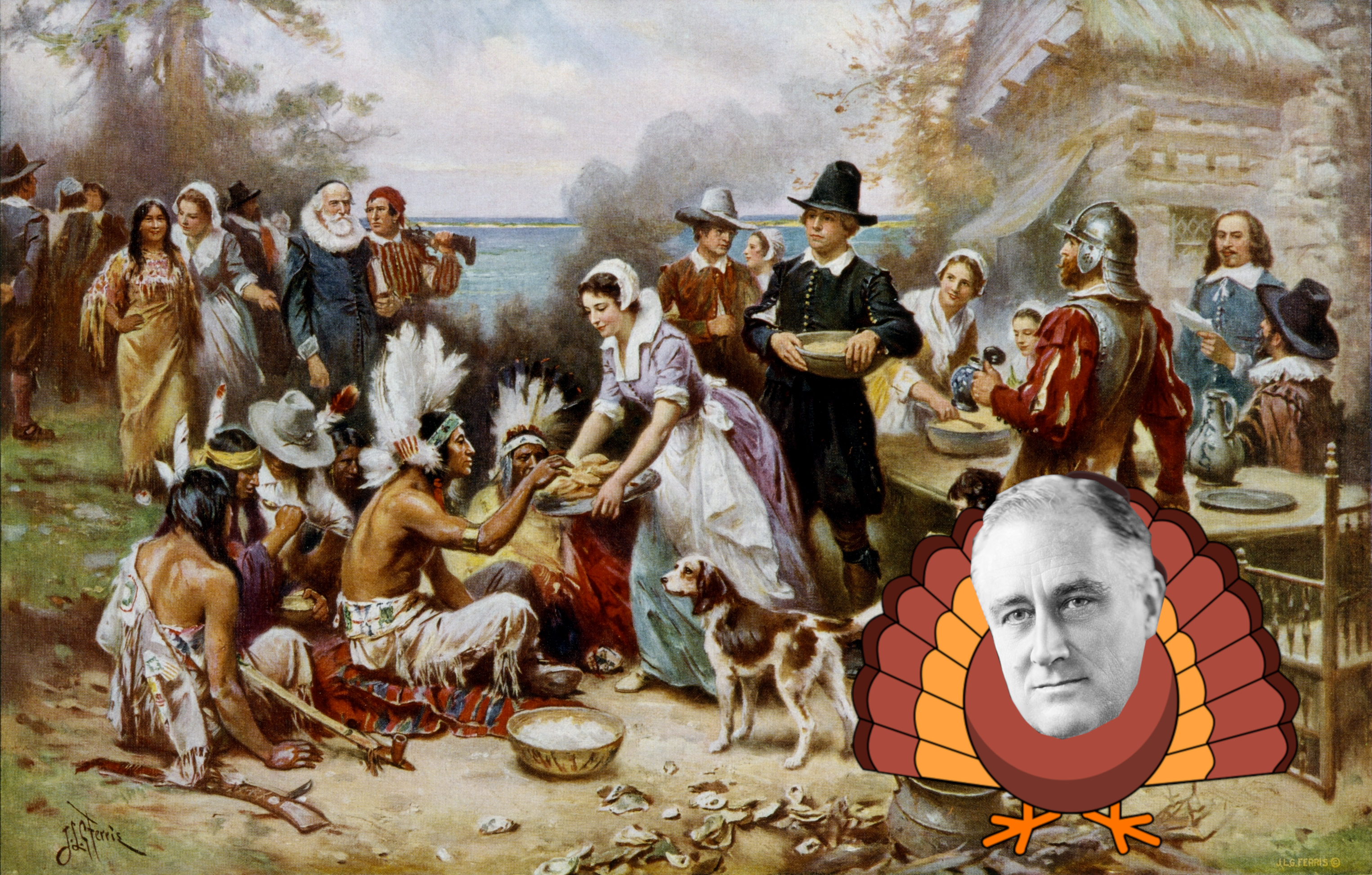The Time FDR moved Thanksgiving for fun and profit
Thanksgiving is late this year. It’s actually the latest it can be. Set by Congress in 1942 as the fourth Thursday in November, a Thanksgiving this late in the month requires that November 1st falls on a Friday. The result is a truncated Christmas season and maybe a comment here and there. Hardly notable. But there’s a history here that not many know about, dating back to another late Thanksgiving in 1939.
Before we go back 80 years, it’s necessary to first go a little bit further. History is linear, right? I think it’s fair to assume that we all know the basic story of Thanksgiving: a fleet of pilgrims land on the Autumn shores of North America and meet a group of Native Americans. Elected as fit representatives for the millions of people on the continent, they happily trade away their rights to America’s land resources in exchange for student loans, compounding mortgages, and some beads.
Fast forward a couple centuries, though, we see a here-and-there introduction of Thanksgiving as an American tradition. For a while, the celebration of Thanksgiving was a privilege held at the discretion of the President, like the Pope and his ability to cancel Easter. George Washington named a day of Thanksgiving in February. Thomas Jefferson, disappointed with a citizenry that refused to clean up for itself and pick up its toys, deigned not to name a Thanksgiving date at all. The holiday was sporadic and unevenly-applied until the Civil War, when Abraham Lincoln (you know this one, right?) declared that Thanksgiving would be celebrated on the final Thursday of November each year. Today, the rule’s a little different.
In Fall of 1939, the situation was similar to this year’s, but worse. Thanksgiving, still following the rule set forth by Papa Lincoln, fell on November 30th. Julian Calendar fans will know this day as “the last one in November”. Some economists saw the late holiday as cause for alarm. Even back in 1939, Thanksgiving was the harbinger of the Christmas holiday season. A later Thanksgiving means a shorter Christmas season. A shorter Christmas season could potentially mean a shorter spending season and less money in the pockets of American businessmen. Altogether, it’s not hard to identify this as the unnecessary whinges of the fat cat capitalist class.
Fun fact about 1939, though: it’s the great depression. The United States economy is not great. Things are better than they were at the face-end of the decade, but the atmosphere is very much “let’s not take our chances”. In other words, an extra week of economic stimulus is an extra week of economic stimulus. So our boy, Franklin D. Roosevelt himself does it. He declared that this year’s Thanksgiving would be a little younger and a lot cuter, taking place on the 23rd of November rather than the late late 30th. And that was that.
Except it wasn’t. Cultural and political backlash to Roosevelt’s decision was immediate and hot. The local governments of twenty-two states refused to recognize the holiday’s new date and Roosevelt’s opponent in the 1936 Presidential election, Alf Landon, called the decision impulsive, adding “If the change has any merit at all, more time should have been taken working it out… instead of springing it upon an unprepared country with the omnipotence of a Hitler.”
…again, keep in mind that this is 1939. Hitler is alive and gearing up to invade Poland. Big yikes for Alf. Still, criticism of Roosevelt’s plan wasn’t entirely unfair. The decision to move the holiday was made less than half a year out, long enough to change the date of a family gathering, but not long enough to amend pre-set football schedules. Messing with Thanksgiving is one thing, but the national religion? The nerve. This was a mistake the President learned from when he made sure to announce 1940’s change a year out. Indeed, both 1940 and 1941 followed 1939’s lead, with more of the public, and more states, gradually hopping on. When New Jersey agreed to celebrate the new and unchanged Thanksgiving, the mayor of Atlantic City would concede only to the celebration of “Franksgiving”. Got ‘im.
In 1941, though, Roosevelt cut the trend off, claiming the earlier holiday was an experiment which had failed to deliver results. Since then, the idea that an early Thanksgiving provides a holiday stimulus has found some traction among the economically inclined, but Franksgiving was no more.
… That’s not to say the endeavor was entirely unsuccessful, though. Before the end of 1941, Congress and the President signed a joint resolution to declare Thanksgiving a holiday occurring on, not the last, but the fourth Thursday in November. Thanksgiving can still be late, but it can’t be later than this.
More:
- Vox: When FDR moved Thanksgiving: the presidential power grab that tore a nation apart
- Politico: Franksgiving
- Notre Dame: Franksgiving
